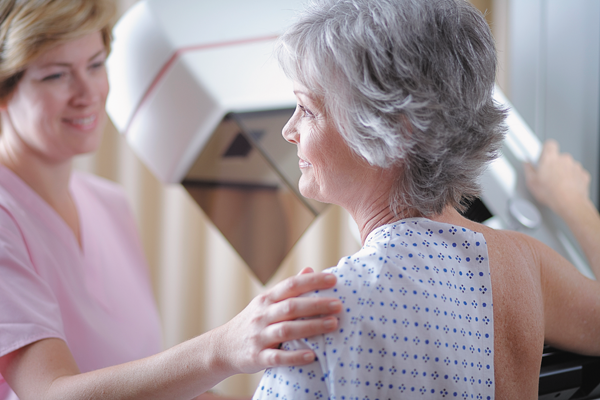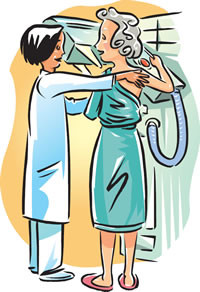
What can magnesium do for you and how much do you need?

Dry socket: Preventing and treating a painful condition that can occur after tooth extraction

What happens during sleep �� and how to improve it

How is metastatic prostate cancer detected and treated in men over 70?

Could biofeedback help your migraines?

Plantar warts: Options for treating this common foot condition

Cancer survivorship: What comes next after treatment

Nutritional yeast: Does this savory, vegan seasoning pack a nutritional punch?

Salmonella is sneaky: Watch out

Two jobs may lower the odds of dying from Alzheimer's disease �� but why?
Breast Cancer Archive
Articles
Which mammogram guidelines should I follow?
Ask the doctor
Q. I'm a 48-year-old woman, and I've never had a mammogram. Different guidelines seem to say different things. What do you recommend?
A. You're right, there are several different guidelines. Probably the two most often consulted by doctors are those of the U.S. Preventive Services Task Force (USPSTF) and the American Cancer Society (ACS). Recent changes by the ACS bring its recommendations nearer to those of USPSTF. They disagree slightly about you. ACS says you should have a mammogram (because you are over 45), but USPSTF says to begin at age 50. Both expert committees stress that these recommendations apply only to women who are not at extra risk of breast cancer (extra risk includes, for example, having a parent, sibling, or child who's had breast cancer). If a woman is at extra risk, she should start getting mammograms earlier.
Changes to mammogram screening recommendations
Image: Thinkstock
News briefs
The guidelines for routine breast cancer screenings are changing again. The American Cancer Society (ACS) published its new recommendations Oct. 20, 2015, in The Journal of the American Medical Association, suggesting that women at average risk for breast cancer now wait until age 45 to begin getting yearly mammograms (it had been age 40) and then get yearly mammograms until age 54. After that, the ACS now recommends that average-risk women ages 55 to 74 transition to screening every other year (instead of annually). It's a big shift for the ACS, and the recommendations are now more in line with the guidelines that came from the U.S. Preventive Services Task Force (USPSTF) in 2009, which recommended mammograms every two years for average-risk women ages 50 to 74 and advise against routine screening before age 50 in these women. The USPSTF guidelines have been controversial since they came out. But no one is saying that women at increased risk for breast cancer should wait to get a mammogram; it's a decision that must be made by a woman and her doctor, based on her risk factors. One other big change to the ACS guidelines: that women continue screening mammography only if they have a life expectancy of 10 years or longer.
High olive oil consumption linked to lower breast cancer risk
Image: Bigstock
Research we're watching
A preliminary study published Sept. 14, 2015, in JAMA Internal Medicine reported that older women in Spain who ate a traditional Mediterranean diet enhanced with extra-virgin olive oil were less likely to be diagnosed with breast cancer. The study was part of a large Spanish clinical trial, Prevención con Dieta Mediterránea (PREDIMED).
PREDIMED looked at three different groups of women. One followed the Mediterranean diet plus extra servings of olive oil. A second followed the diet plus extra servings of nuts. Those in the third group were ad-vised to reduce their fat intake. The study followed about 4,300 women ages 60 to 80 for five years.
Research we're watching: Analysis raises new questions about treating noninvasive breast cancer
The purpose of treating ductal carcinoma in situ (DCIS)—the earliest, noninvasive form of breast cancer (often called "precancer")—is to prevent those lesions from becoming invasive and thereby greatly reduce the risk of dying from breast cancer. As mammography has become more precise, it has detected more DCIS, and more women get treatment with surgery and often radiation as well. An analysis published online by JAMA Oncology on Aug. 20, 2015, adds to increasing questions about the best way to manage DCIS in most women diagnosed with it.
Canadian researchers analyzed 20 years of data from 108,000 women with DCIS in a database maintained by the National Cancer Institute. Most women were treated with lumpectomy, often followed by radiation, or mastectomy. The researchers found that treatment with radiation or mastectomy did not lower the overall breast cancer death rate in women with DCIS. It remained at 3.3%—the average death rate from all breast cancers. However there were some groups—including African American women and women under 40—in whom the death rate was higher (7% to 8%).
Should postmenopausal women boost their aerobic exercise time?
Among 400 postmenopausal women who were previously inactive, those who did 300 minutes per week of moderate or high intensity exercise had more success at reducing total fat after one year than those who exercised for 150 minutes per week.
Mediterranean diet may prevent breast cancer, but there are other reasons to pour on the olive oil
The PREDIMED study showed that the Mediterranean diet can statistically lower a person’s risk for cardiovascular disease, including heart attacks, strokes, and death from heart-related causes. The data also suggest that a Mediterranean diet is associated with a reduced chance of getting breast cancer. This small analysis has some limitations, but provides another reason to consider this already healthful way of eating.
Increased mammography may find more breast cancers without lowering deaths
Ideally, screening mammography detects small breast cancers so that they can be removed before they grow, metastasize, and kill. To tell whether screening is succeeding, researchers from Harvard and Dartmouth looked at the rates of mammography, the diagnosis of small breast cancers, large breast cancers, and breast cancer deaths in 16 million women 40 or older in the United States from 2000 through 2010. They found that when mammography rates increased 10%, the number of small cancers detected went up 25%, and the number of large cancers increased by 7%. There was no decline in breast cancer deaths. They concluded that mammography is finding—and women are being treated for—small cancers that may not progress to invasive disease or metastasize to other parts of the body.
The results, which were published online July 6, 2015, by JAMA Internal Medicine, echo those of earlier findings. They underscore a dilemma facing women and their doctors: To get annual mammograms and risk being treated for a tumor that may never become harmful, or have mammograms less frequently and risk missing a cancer until it is larger. The U.S. Preventive Services Task force recommends having a mammogram every one to two years for women ages 50 to 79. The American Cancer Society suggests annual mammograms beginning at age 40. You may want to discuss your personal risk profile, and your preferences, with your doctor.
Study gives new insights into obesity and breast cancer
An analysis from the Women's Health Initiative (WHI) suggests not only that postmenopausal women who are overweight or obese have a higher risk of invasive breast cancer than women of normal weight but also that the excess risk increases as a woman's weight rises beyond obesity. The results were published online June 11, 2015, by JAMA Oncology.
A team of investigators from several medical centers studied data on 67,000 postmenopausal women who enrolled in the WHI between 1993 and 1998. They were followed for a median of 13 years. During that time, 3,388 invasive breast cancers were detected. The researchers analyzed the distribution of breast cancer among weight classes and calculated the risks for women who were overweight (body mass index, or BMI, of 25 to 30), obese (BMI 30 to 35), or very obese (BMI over 35) compared with women of normal weight (BMI 25 or less). They found that the increased risk of developing breast cancer ranged from 17% in women who were overweight to 59% in those with a BMI over 35. Among women who began the study at a normal weight, those who gained at least 5% of their original weight had a 12% higher risk of developing breast cancer than those who maintained their original weight. Neither losing weight nor using hormone therapy had a significant effect on risk for women of any weight.
Draft recommendations on screening mammography continue to stir debate
The release of new guidelines on mammography never fails to renew the heated controversy over the potential benefits and harms of this procedure. The latest draft guidelines from the U.S. Preventive Services Task Force (USPSTF) are no exception. The USPSTF recommends that women begin having mammograms at age 50 and stop at age 75. (The American Cancer Society and other medical organizations recommend that women begin getting regular mammograms at age 40.) The draft recommendations say there isn’t enough evidence to recommend or discourage the use of a new technique called 3-D mammography for screening, and also say there isn’t enough evidence to recommend that women with dense breasts, who are at higher risk of breast cancer, should have an ultrasound or MRI in addition to screening mammography. Comments can be made on the USPSTF draft until 8:00 pm Easter Time today. A final version of the recommendations is expected to be released in the fall of 2015.
Good news about early-stage breast cancer for older women
Image: Thinkstock |
Although the chance of developing breast cancer increases after age 60, the likelihood of dying from it is low.
If you're like most women, you consider the possibility of learning you have breast cancer every time you have a mammogram. But breast cancer probably doesn't seem as scary as it did when you were younger, because there has been so much good news about breast cancer in the last 20 years—improvements in mammography, advances in surgery and reconstruction, and drugs that are more effective and less toxic.

What can magnesium do for you and how much do you need?

Dry socket: Preventing and treating a painful condition that can occur after tooth extraction

What happens during sleep �� and how to improve it

How is metastatic prostate cancer detected and treated in men over 70?

Could biofeedback help your migraines?

Plantar warts: Options for treating this common foot condition

Cancer survivorship: What comes next after treatment

Nutritional yeast: Does this savory, vegan seasoning pack a nutritional punch?

Salmonella is sneaky: Watch out

Two jobs may lower the odds of dying from Alzheimer's disease �� but why?
Free Healthbeat Signup
Get the latest in health news delivered to your inbox!
Sign Up








